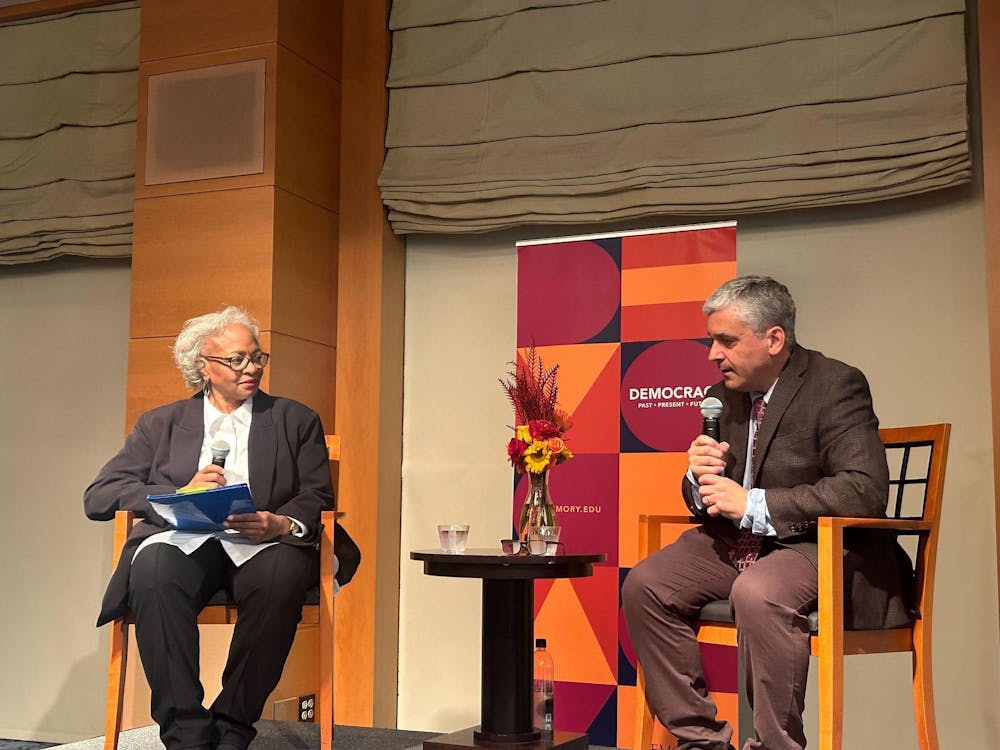Students, faculty and staff crowded into Emory University’s Micheal C. Carlos Museum’s Ackerman Hall on Sept. 18 to hear Harvard University (Mass.) David Rockefeller Professor of Latin American Studies and Professor of Government Steven Levitsky and Robert W. Woodruff Professor of African American Studies Carol Anderson address the current state of American democracy. The event was part of the Fox Center for Humanistic Inquiry’s yearlong lecture series on democracy.
Levitsky, author of “How Democracies Die” and “Tyranny of the Minority: Why American Democracy Reached the Breaking Point,” delivered the keynote lecture on the fragility of American democracy in the face of the upcoming presidential election. Anderson, author of “White Rage: The Unspoken Truth of Our Racial Divide,” spoke after Levitsky and described the historical evolution of American democracy to the present.
During his speech, Levitsky described America’s transition toward a multiracial democracy and responses to this trend. Levitsky said that American politics is in the midst of democratic backsliding, which he attributed to the Republican party’s inability to find a diverse voting base in a multiracial democracy.
“Refusing to accept election results, flirting with political violence and endorsing an openly authoritarian candidate are clear signs of a party that is no longer fully committed to democracy,” Levitsky said.
Although Levitsky said American democracy is in decline, he added that Americans still have a chance to reverse course.
“Americans have a long reformist tradition, from the Bill of Rights to the abolition movement, to the reconstruction reforms, to the women's suffrage movement, to the progressive era, to the civil rights era, generations of Americans have worked to make our system, slowly, more democratic, but over the last half-century or so, going back to the 70s, we’ve stopped during that work,” Levitsky said. “We need to get back to our country’s reformist tradition.”
Anderson then engaged with Levitsky in a discussion about the future of American democracy, mainly focusing on the Republican party’s voter base, the United States’ history of racial tensions and the creation of a multiracial democracy in America. Anderson emphasized the importance of protecting democracy, cautioning that many Americans dismiss the threat of authoritarianism under the guise of American exceptionalism.
“The Jim Crow South was an authoritarian regime,” Anderson said. “You had a one-party system that relied heavily on violence.”
During the Q&A session, some audience members voiced concerns about how the Harris-Trump election could further jeopardize the state of the United States. Levitsky said that while the election feels high-stakes, it is not the end of the fight for preserving American democracy.
“No matter who wins the election, on the next day, we're all gonna have to get up and defend democracy,” Levitsky said.
Some audience members said they left the talk feeling more hopeful for America’s future. Alex Minovici (23Ox, 25C) expressed optimism and praised Emory for creating spaces for scholars to interact and generate new ideas.
“The most important thing probably is to have these conversations out loud and not behind closed doors,” Minovici said.
Alexandra Lind (25C) said the conversation alleviated some of her doomsday fears surrounding the upcoming election.
“Just as if Harris is elected, MAGA is not going to away, we’re not going to go away if he’s elected,” Lind said.
Levitsky and Anderson urged the audience to view the fight for democracy as extending beyond any one election.
“The United States today stands at a crossroads,” Levitsky said. “We will either be a multiracial democracy in the 21st century or we will not be a democracy.”






